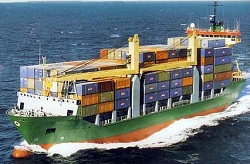
After four years of hibernation, U.S. trade policy appears poised to move forward in 2011. President Obama wants to promote U.S. exports as a way to stimulate the economy, while Republican leaders in the new Congress have signaled their eagerness to work with the president to expand trade with key allies.
Trade policy is ripe for bipartisan cooperation. Since World War Two, both parties have worked together to enact major trade-expansion agreements, from eight rounds in the General Agreement on Tariffs and Trade beginning in 1948 to the North American Free Trade Agreement in 1993 to China’s entry into the World Trade Organization in 2001.
The U.S. government turned away from the disastrous protectionism of the 1930s as a way of promoting economic growth at home and abroad. Democrats and Republicans alike understood that exports allow U.S. companies to reach new markets and expand production, while imports bless consumers with lower prices and more variety while fueling competition, innovation and higher productivity among domestic producers.
Trade policy is ripe for bipartisan cooperation
Our leaders also recognized that expanding trade can be an effective tool of foreign policy, tying us more closely to our allies, promoting peace, and reducing poverty in the developing world.
At the top of the congressional trade agenda this year will be three pending trade agreements — with South Korea, Colombia, and Panama. The agreements were signed by the Bush Administration but have been bottled up since 2007 by congressional Democrats eager to please their labor-union benefactors. Republican leaders have rightly insisted that all agreements be passed by this summer.
The Korean agreement would eliminate barriers to trade with our seventh largest trading partner. According to the U.S. International Trade Commission, it would boost U.S. exports by more than $10 billion once fully implemented. The agreement would keep U.S. exporters on equal footing with their competitors in the European Union, which will enter into its own free trade agreement with South Korea on July 1 of this year.
The Colombia agreement would boost U.S. exports by another $1 billion, while deepening our ties to a key Latin American ally. Colombia is the third largest market for U.S. exports in Latin America. Imports from Colombia already enjoy virtually duty-free access to the U.S. market because of the Andean Trade Preferences Act, while U.S. exports to Colombia face average tariffs of 11 percent. The agreement would deliver the “level playing field” politicians are always demanding.
Union opponents of the Colombia agreement cite lingering violence in that country against trade unionists, but their complaints ignore the dramatic social progress in Colombia during the past decade. Under former President Uribe and now under his successor President Santos, the Colombian government has restored the rule of law and largely defeated the Marxist FARC insurgency. The murder rate in the country has dropped by 40 percent since 2002 and killings of union members have dropped even more sharply.
Imports from Colombia already enjoy virtually duty-free access to the U.S. market … while U.S. exports to Colombia face average tariffs of 11 percent. The agreement would deliver the “level playing field” politicians are always demanding.
Congress and the President can also promote trade by exercising leadership in the ongoing Doha round of negotiations among members of the WTO. Although the talks have stalled in recent years, world leaders have expressed renewed interest in reaching a comprehensive agreement by the end of 2011. An ambitions WTO deal would lower global barriers to trade in agricultural goods, manufactured products, and services, benefiting American consumers and producers alike.
Key to U.S. leadership will be a willingness to reduce our own agricultural subsidies and trade barriers, a sticking point so far with important developing countries such as Brazil and India. The next farm bill is due to be written by the current Congress. The big question will be whether Republicans, and especially the new Tea-Party-affiliated members, will be willing to apply their free-market, small-government principles by cutting trade-distorting farm programs popular in their rural districts.
Another major trade issue in 2011 will be managing our commercial relationship with China. Critics complain about the large bilateral trade deficit we run with China, but they ignore the fact that millions of American consumers benefit every day from those lower-cost imports. China has also become the third largest market for U.S. exports, behind only our NAFTA partners Canada and Mexico.
China continues to loosen its grip on its managed currency, allowing the renminbi to appreciate slowly toward a rate that more closely reflects economic fundamentals. Evidence is lacking that China’s currency policy has had a major impact on the bilateral trade deficit, or U.S. manufacturing and employment. It would be foolish of Congress and the Administration to pick a needless trade fight with our third largest customer for U.S. exports.
By reaffirming America’s commitment to a more open economy in 2011, Republican leaders in Congress can boost economic growth and job creation, strengthen our ties to friendly nations, and work constructively across the aisle, to the benefit of Main Street Americans across the country.
 Daniel Griswold is director of the Cato Institute’s Center for Trade Policy Studies and author of the 2009 book, Mad About Trade: Why Main Street America Should Embrace Globalization.
Daniel Griswold is director of the Cato Institute’s Center for Trade Policy Studies and author of the 2009 book, Mad About Trade: Why Main Street America Should Embrace Globalization.




